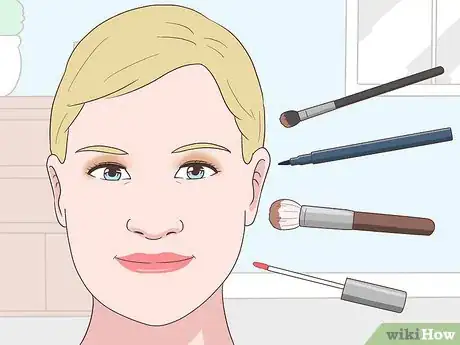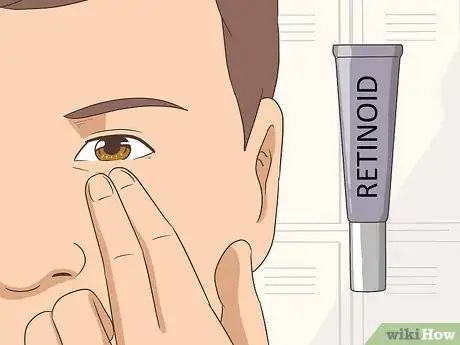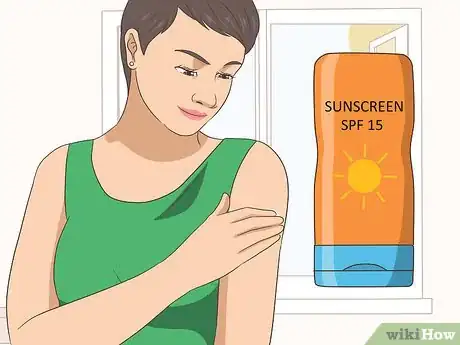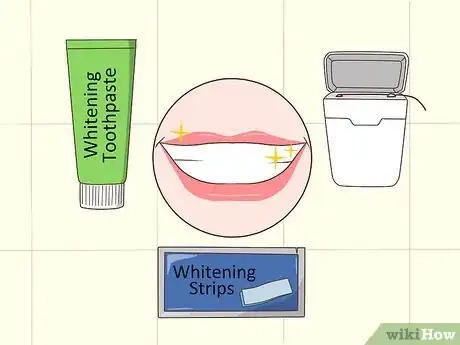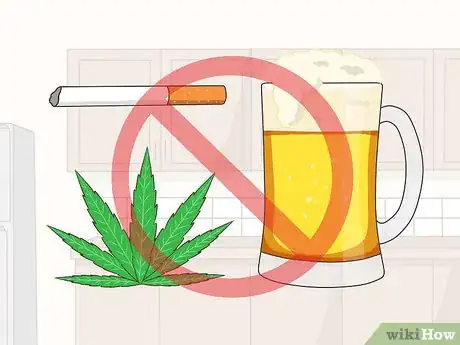This article was co-authored by Heather Richmond, MD. Dr. Heather Richmond, MD is a board certified Dermatologist at Dermatology and Laser Surgery Center in Houston, Texas. With over nine years of experience, Dr. Richmond specializes in comprehensive dermatology including medical, surgical, and cosmetic procedures. She graduated cum laude from Yale University with a BA in Molecular, Cellular, and Developmental Biology. She earned her MD from the University of California, Irvine School of Medicine, where she was inducted into the Alpha Omega Alpha Honor Medical Society. She completed her Internal Medicine internship at Cedars-Sinai Medical Center and her Dermatology residency at The University of Texas MD Anderson Cancer Center in Houston. Dr. Richmond is a fellow of the American Academy of Dermatology and is a member of the American Society for Dermatologic Surgery, American Society for Laser Medicine and Surgery, and the Texas and Houston Dermatological Societies.
There are 8 references cited in this article, which can be found at the bottom of the page.
This article has been viewed 48,491 times.
Turning 30 can feel like a big deal—but don’t worry, you can still look and feel great as you enter this new decade! There are some practical steps, like updating your skin care routine and keeping your teeth white, that you can take to help your skin, body, and attitude look and feel younger than your actual age.
Steps
Expert Q&A
-
QuestionHow can you avoid getting wrinkles?
 Heather Richmond, MDDr. Heather Richmond, MD is a board certified Dermatologist at Dermatology and Laser Surgery Center in Houston, Texas. With over nine years of experience, Dr. Richmond specializes in comprehensive dermatology including medical, surgical, and cosmetic procedures. She graduated cum laude from Yale University with a BA in Molecular, Cellular, and Developmental Biology. She earned her MD from the University of California, Irvine School of Medicine, where she was inducted into the Alpha Omega Alpha Honor Medical Society. She completed her Internal Medicine internship at Cedars-Sinai Medical Center and her Dermatology residency at The University of Texas MD Anderson Cancer Center in Houston. Dr. Richmond is a fellow of the American Academy of Dermatology and is a member of the American Society for Dermatologic Surgery, American Society for Laser Medicine and Surgery, and the Texas and Houston Dermatological Societies.
Heather Richmond, MDDr. Heather Richmond, MD is a board certified Dermatologist at Dermatology and Laser Surgery Center in Houston, Texas. With over nine years of experience, Dr. Richmond specializes in comprehensive dermatology including medical, surgical, and cosmetic procedures. She graduated cum laude from Yale University with a BA in Molecular, Cellular, and Developmental Biology. She earned her MD from the University of California, Irvine School of Medicine, where she was inducted into the Alpha Omega Alpha Honor Medical Society. She completed her Internal Medicine internship at Cedars-Sinai Medical Center and her Dermatology residency at The University of Texas MD Anderson Cancer Center in Houston. Dr. Richmond is a fellow of the American Academy of Dermatology and is a member of the American Society for Dermatologic Surgery, American Society for Laser Medicine and Surgery, and the Texas and Houston Dermatological Societies.
Board Certified Dermatologist Take good care of your skin. Use retinol, a C serum, and sunscreen to avoid getting wrinkles.
Take good care of your skin. Use retinol, a C serum, and sunscreen to avoid getting wrinkles. -
QuestionHow do you choose skincare products?
 Heather Richmond, MDDr. Heather Richmond, MD is a board certified Dermatologist at Dermatology and Laser Surgery Center in Houston, Texas. With over nine years of experience, Dr. Richmond specializes in comprehensive dermatology including medical, surgical, and cosmetic procedures. She graduated cum laude from Yale University with a BA in Molecular, Cellular, and Developmental Biology. She earned her MD from the University of California, Irvine School of Medicine, where she was inducted into the Alpha Omega Alpha Honor Medical Society. She completed her Internal Medicine internship at Cedars-Sinai Medical Center and her Dermatology residency at The University of Texas MD Anderson Cancer Center in Houston. Dr. Richmond is a fellow of the American Academy of Dermatology and is a member of the American Society for Dermatologic Surgery, American Society for Laser Medicine and Surgery, and the Texas and Houston Dermatological Societies.
Heather Richmond, MDDr. Heather Richmond, MD is a board certified Dermatologist at Dermatology and Laser Surgery Center in Houston, Texas. With over nine years of experience, Dr. Richmond specializes in comprehensive dermatology including medical, surgical, and cosmetic procedures. She graduated cum laude from Yale University with a BA in Molecular, Cellular, and Developmental Biology. She earned her MD from the University of California, Irvine School of Medicine, where she was inducted into the Alpha Omega Alpha Honor Medical Society. She completed her Internal Medicine internship at Cedars-Sinai Medical Center and her Dermatology residency at The University of Texas MD Anderson Cancer Center in Houston. Dr. Richmond is a fellow of the American Academy of Dermatology and is a member of the American Society for Dermatologic Surgery, American Society for Laser Medicine and Surgery, and the Texas and Houston Dermatological Societies.
Board Certified Dermatologist Consider your age and skin type while choosing a skincare product. See how oily, dry, or dark your skin is and whether there is any discoloration. If it is dry, use products that are thicker or more oil-based. Use light oil-free products for oily or acne-prone skin.
Consider your age and skin type while choosing a skincare product. See how oily, dry, or dark your skin is and whether there is any discoloration. If it is dry, use products that are thicker or more oil-based. Use light oil-free products for oily or acne-prone skin.
References
- ↑ https://www.thehealthsite.com/beauty/how-to-look-like-in-your-20s-when-in-your-30s-a-dermatologists-guide-241713/
- ↑ Heather Richmond, MD. Board Certified Dermatologist. Expert Interview. 15 September 2020.
- ↑ https://www.allure.com/gallery/look-younger-tips
- ↑ Heather Richmond, MD. Board Certified Dermatologist. Expert Interview. 15 September 2020.
- ↑ https://www.allure.com/gallery/look-younger-tips
- ↑ Heather Richmond, MD. Board Certified Dermatologist. Expert Interview. 15 September 2020.
- ↑ https://www.thehealthsite.com/beauty/how-to-look-like-in-your-20s-when-in-your-30s-a-dermatologists-guide-241713/
- ↑ https://www.goodhousekeeping.com/health/diet-nutrition/a46956/how-much-water-should-i-drink/
- ↑ Alice Wu. Image Consultant. Expert Interview. 12 June 2020.
- ↑ Alice Wu. Image Consultant. Expert Interview. 12 June 2020.
- ↑ https://www.allure.com/gallery/look-younger-tips
- ↑ https://www.allure.com/gallery/look-younger-tips
- ↑ https://www.allure.com/gallery/look-younger-tips
- ↑ https://www.thehealthsite.com/beauty/how-to-look-like-in-your-20s-when-in-your-30s-a-dermatologists-guide-241713/
- ↑ https://www.telegraph.co.uk/better/fashion/30-beauty-habits-you-should-adopt-in-your-30s/
- ↑ https://www.telegraph.co.uk/better/fashion/30-beauty-habits-you-should-adopt-in-your-30s/
- ↑ http://www.nowloss.com/How-to-look-younger.htm
- ↑ https://www.health.com/health/gallery/0,,20340112,00.html
- ↑ https://www.allure.com/gallery/look-younger-tips
- ↑ https://www.telegraph.co.uk/better/fashion/30-beauty-habits-you-should-adopt-in-your-30s/


